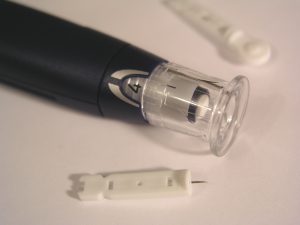 My client was a known diabetic when she came to treat at an urgent care facility in Georgia. She clearly presented with symptoms (nausea, vomiting, diarrhea for 4 days, fatigued, lightheaded, weak, short of breath and reported unintentional weight loss, etc.) that could be the result of hyperglycemia and/or diabetic ketoacidosis. Unfortunately, the attending advanced practice registered nurse failed to perform a proper differential diagnosis.
My client was a known diabetic when she came to treat at an urgent care facility in Georgia. She clearly presented with symptoms (nausea, vomiting, diarrhea for 4 days, fatigued, lightheaded, weak, short of breath and reported unintentional weight loss, etc.) that could be the result of hyperglycemia and/or diabetic ketoacidosis. Unfortunately, the attending advanced practice registered nurse failed to perform a proper differential diagnosis.
In particular, the nurse failed to: 1) order glucose testing based on patient presentation, medical history and available urinalysis results; 2) recognize and diagnose symptoms of diabetic ketoacidosis, a life-threatening medical complication of diabetes mellitus; and 3) provide appropriate medical care including intravenous insulin and/or referral to higher level of care including emergency department or hospital admission. If the nurse had followed proper diabetic protocol and differential diagnosis, then my client would be alive today.
The nurse presumed the patient was dehydrated due to her illness and provided intravenous fluid replacement. She later released my client without further diagnostic work up, treatment or referral to a higher level of care. Therefore, the resulting breaches in the standard of care prevented our client from receiving appropriate assessment and care for her condition which would have included management of hyperglycemia in the clinic or referral to a higher level of care, such as emergency room or hospital admission via EMS. Combined, the failure to diagnose diabetic ketoacidosis caused a critical delay of care resulting in the untimely death of my client. Unfortunately, this breach of the standard of care proximately caused the death of my client – simply put, the nurse should have sent my client to the ICU for an insulin drip.
The autopsy report indicated my client’s vitreous humor glucose level was 413 mg/dO at the time of evaluation. Vitreous humor testing postmortem for assessment of diabetic related death is the preferred method of assessment for several electrolytes including glucose as levels remain relatively stable after time of death compared to a rapid decline in serum concentration levels. When used as a marker of hyperglycemia, vitreous humor glucose levels measured above 10mmol/L (approximately 180 mg/dL) indicates the hyperglycemic state was cause for death. My client was well above this range at the time of her autopsy.
My client’s death was attributable to diabetic ketoacidosis based upon her symptoms, medical records, urinalysis and medical examiner records. Diabetic ketoacidosis is a life threatening complication that must be timely recognized, diagnosed and treated to prevent death. Left untreated, diabetic ketoacidosis would be expected to cause and did cause the death of my client. It was our contention that these events were the direct and proximate result of the defendant nurse’s negligent failure to recognize, diagnose and promptly treat diabetic ketoacidosis. The delayed diagnosis and lack of timely treatment was a substantial and proximate cause of the death of my client.
Suit was brought on behalf of the surviving spouse, as he was also appointed administrator of the estate of his deceased wife, against the nurse and her employer for negligence, gross negligence, negligent hiring, retention, supervision, respondeat superior, wrongful death, punitive damages, compensatory damages, pre-death mental and physical pain and suffering, present value of lost benefits and earnings, funeral and burial expenses, medical expenses, full value of the life of the decedent, and any and all survival and wrongful death damages, in an amount that was to be determined by the jury, plus costs and interest and any other relief allowed by law. After extensive discovery and depositions, the parties agreed to an out of court confidential settlement at mediation.
Hyperglycemia is regularly seen in acute care settings such as emergency rooms and urgent care centers. Moreover, the public at large is increasingly using urgent care centers rather than emergency rooms or primary care physicians. The problem, I believe, is that there is a high likelihood of a majority of patients being discharged to home without continuity of care without following the proper differential diagnosis and glucose check in urgent care settings. In our case, the urgent care center had no protocol for diabetes or hyperglycemia.
The Law Offices of Kevin C. Ford is currently accepting wrongful death claims as the result of medical malpractice throughout the State of Georgia. If a loved one has been injured or died as the result of the negligence of a health care provider, then please contact me today for a free consultation and evaluation of your case. I have over 30 years experience and practice throughout the State of Georgia and can come to you. Please call 404-869-6969 to secure your rights today!
 Atlanta Personal Injury Lawyer Blog
Atlanta Personal Injury Lawyer Blog

